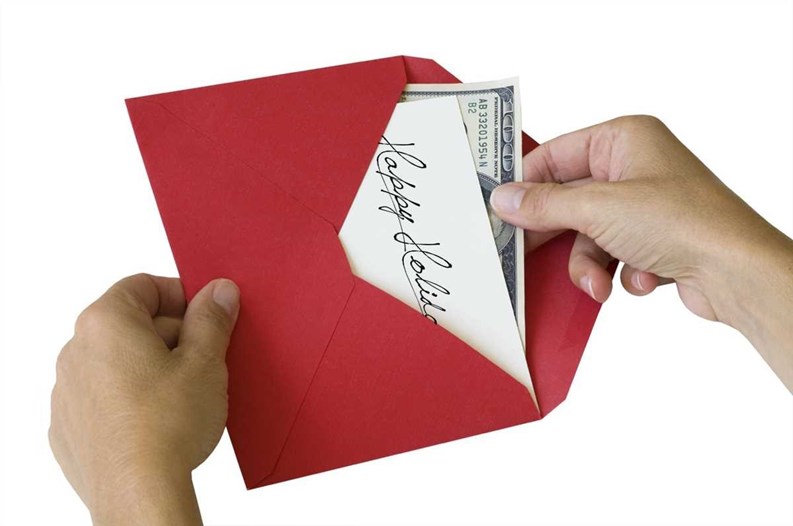Whether you live in a suburb or in the heart of the city, life is expensive. Sometimes it can feel as though everybody from the barista at your favorite coffee shop to the kid who sacks your groceries is trying to nickel-and-dime you half to death. Tip jars are everywhere, sometimes decorated with winsome appeals for change, and sometimes just sitting there expectantly, waiting for you to pony up.
The holiday season compounds the issue: there are gifts to be bought, travel to be booked, parties to attend, inclement weather to worry about … and the anxiety that many of us feel when we try to figure out what kind of tip to give the people who (hopefully) make our everyday life a little easier: our building and HOA staff.
Clearly, a reward for work well done is a welcome gift, especially at this time of year. Building superintendents, chief engineers, maintenance persons and handymen often find themselves under sinks or in dank basements at odd hours, patching leaky pipes or coaxing temperamental boilers back to life.
In colder climates they shovel snow, scatter salt, and do a score of other tasks made that much harder by winter weather. Doormen and lobby attendants wait patiently in drafty lobbies and vestibules, ready to help you with your shopping bags or call you a cab. At this time of year, it's not only customary to show your appreciation for the work your building or association staff does for you and your neighbors—it’s just plain good manners.
Tipping Through the Ages
“But,” you may ask, “why tip at all? Opening the door and helping residents out is the doorman’s job—he or she gets a salary already.” A good point, and one that bears closer examination.
Though there is some disagreement about the origins of tipping, most historians agree that the practice likely began during the heyday of the Roman Empire with rich, landowning citizens throwing a few coppers to the peasants who served them as a gesture of the master’s wealth and generosity. It has also been suggested that “tipping” was the term used by feudal lords in Medieval Europe to describe their practice of throwing gold to their serfs as they passed on horseback; the gesture assured the nobleman safe passage through the crowd.
Though noblemen and ladies no longer ride through the streets on horseback, casually tossing gold pieces to the ragged masses, the practice of tipping has stayed with us—at least in North America. The word “TIPS” in modern parlance is actually an acronym for “To Insure Prompt Service,” and the list of people who are commonly tipped includes hair and nail salon workers, bellhops, cab drivers, newspaper delivery people, porters, valets, bartenders, and, of course, restaurant wait staff.
With the advent of modern multifamily housing, apartment building and homeowners association staff joined the tip list. As far as your building support staff is concerned, the word “TIPS” could very well stand for “Time-Intensive Perpetual Service,” since many maintenance and support workers often live on-site and are essentially on-call 24 hours a day. Though you may tip your maintenance man or your doorman throughout the year for doing various small jobs for you, it’s good manners—and a gesture of appreciation for all they do—to give your building staff a little something extra during the holidays. According to etiquette-master Emily Post, holiday tipping “is a way to say ‘thank you’ to those who have provided service to you throughout the year—letting them know you’re pleased with what they have done for you.”
Holiday tipping etiquette depends on a number of variables. According to Post’s website (www.emilypost.com), the main factors that help determine the gifts you give your building staff are:
• How pleased you are with the service
• The frequency of the service or how long you’ve known the person
• Your budget
• Your regional customs
• The type of establishment (a deluxe vs. more modest building or HOA)
By The Numbers
Clearly, if you live in the basement unit of a run-down tenement owned by your absentee uncle, the issue of tipping is hardly your first priority. Same goes if you're part of a super-self-sufficient cooperative community that composts its own mulch and where every household has a hand in daily maintenance and upkeep. If your building or HOA is like most however, the following chart should help you figure out who gets what. The various amounts quoted below are averages of suggested figures published by Emily Post, the folks at tipping.org, and financial advisor Jean Chatzky, financial editor for NBC's Today Show and former editor of Money magazine.
Building Superintendents and Building Maintenance Personnel: $30—$100. According to Chatzky, “There’s a pretty wide range here, depending on whether you live in a luxury building or a more run-of-the-mill one, and how much the staff is at your beck-and-call during the year.”
Doormen:$25 and up. According to Tipping.org’s holiday tipping guidelines page, “Take into consideration how nice they are to you, if you get lots of visitors or deliveries, and if they’ve actually opened the door for you always. To maintain this level of quality service, you have to pay for it.”
Building Custodians/Porters: $20—$30. These people have a difficult, sometimes unpleasant job. If your kid strewed Cheezy-Puffs all over the lobby carpet, or your dog committed an indoor indiscretion at any point during the year, you owe it to your custodian to remember.
Handymen:$20—$30. This is an instance when the amount of your tip is directly proportionate to the amount of work you’ve requested from your building/HOA handyman during the year. If you just greet each other in the hall, the lower end of the range should suffice. If you’ve gotten him out of bed in the dead of night to fish your cat out of the garbage chute … ask yourself how much such a task is worth to you, and show your appreciation accordingly.
Garage Attendants: $10—$25. If you use your car at odd hours, or if the attendants in your association’s garage or parking lot take special care of your vehicle, or have it ready for you when you get there, an acknowledgment of their attention is in order. You may tip each attendant individually, or earmark a half-month’s parking rate to be divided among the garage staff.
Garbage Collectors: $15—$20. If your building has a contract with a private waste management company; $15 to $20 is the customary amount for holiday tips, according to Tipping.org.
Mail Carriers:Same as garbage collectors.
There is a caveat, here, though. Government agencies—including the U.S. Postal Service and municipal sanitation departments—prohibit their workers from receiving money as a gift or gratuity, but there's no law against doing nice things for people at holiday time or any other time of year. As long as the value of the gratuity or gift doesn't exceed $20 or so, there should be no problem. Fresh baked goods or coffee shop gift cards are never a bad idea, and a letter of appreciation to your mail carrier or sanitation team's supervisor is another great way to let them know how much you appreciate their work.
Other Folks
There is a host of other people you might also want to remember during the holidays—personal trainers, nannies, housekeepers, baby sitters, your stylist—and the range of what’s considered an appropriate for these professionals is wide, and left mostly to personal judgment. You need not tip your property manager or the outside contractors that work at your property.
All Into the Pool
While it may not be common practice in Chicago, some buildings in Manhattan have taken the guesswork out of the tipping process. They organize an annual tipping pool for their building staff for residents to contribute to. Residents put in whatever amount they desire—the money is collected by the super in a rental building and the manager or board in a co-op or a condo—and then the funds are apportioned accordingly, usually by seniority /length of service or by full-time or part-time status.
Michael Wolfe, president of Manhattan-based Midboro Management, notes that some of his buildings, but only a handful, run a tipping pool for this purpose.
And Halstead Management’s Paul Gottsegen, said the practice is common to only about five of his company’s buildings, and that it would work best only in larger building communities.
One of the drawbacks of a tipping pool is that while it provides equal treatment and ensures every staffer is tipped it does not reward according to the value of the service received. If someone goes the extra mile in delivering services, they may not be as fairly compensated, the experts say.
Regardless of the cash value of your gift, however, Chatzky stresses the importance of “[making] sure that you present your tip as an actual present. Put it in a nice card, write a personal note, and deliver it personally rather than, for example, just taping it to the garbage can. And cash is appreciated, rather than checks.”
In what can sometimes seem like a very uncivilized world, it’s important to remember to make a gesture of civility and appreciation to the people who make it their business to lend you a hand and make your life easier—and the holiday season offers a perfect opportunity to do just that.
Hannah Fons is associate editor of The Chicagoland Cooperator.







Leave a Comment